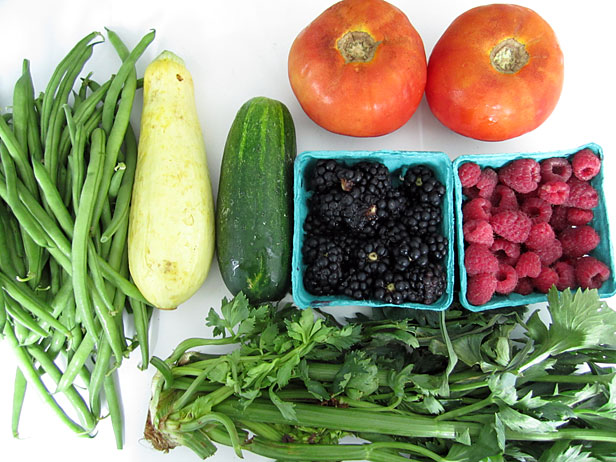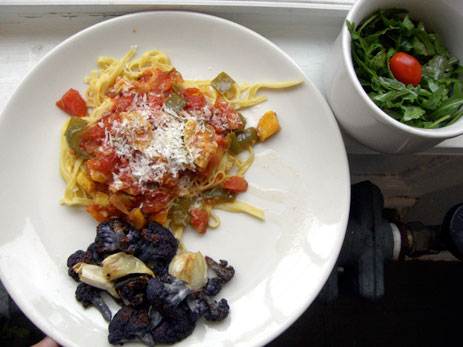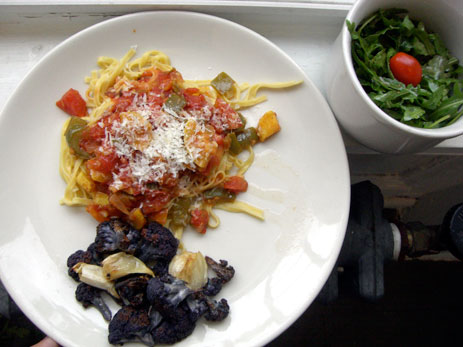 Week 12’s bountyPhotos: Jennifer Prediger
Week 12’s bountyPhotos: Jennifer Prediger
It’s week 12 of eating real food from a Community Supported Agriculture box instead of takeout from a plastic coffin. I am documenting the transformation here in this Urbivore’s Dilemma series.
August marks a rich point in summer when everything seems ready to burst on the vine. I haven’t been around many actual bursting vines, but the basil and mint growing in the kitchen window have gotten noticeably more robust in the last several weeks. And the CSA share has gone gangbusters. With summer squash, cucumbers, big tomatoes, celery, string beans, and cantaloupe, the heavy tote bags in which I cart them home feel like winning the produce lottery.
 This gorgeous purple eggplant in the refrigerator was beckoning. I have to admit, I was in awe of the thing, a bit scared to deal with it. I’d never had a whole eggplant of my own. And after my experience with it, I would recommend everyone go out and get an eggplant — even if you don’t like them.
This gorgeous purple eggplant in the refrigerator was beckoning. I have to admit, I was in awe of the thing, a bit scared to deal with it. I’d never had a whole eggplant of my own. And after my experience with it, I would recommend everyone go out and get an eggplant — even if you don’t like them.
An Italian friend recommended I cut the thing in thin slices and salt it to “remove the water and bitterness.” Huh? Add salt, less bitter?
But salting makes a lot of sense to me now, having seen it in action. I cut open the eggplant, in awe of its white, fluffy, and meaty texture. I sprinkled a couple of tablespoons of salt on it and let it shed water in a colander for about an hour. This made the eggplant saltier and noticeable crisper. It seemed younger, as if it had a vegetable facelift or the produce equivalent of a chemical peel.
Ambivalent about what to do next, I put the eggplant slices on cookie sheets and roasted them on one side for about 15 minutes, flipped them, and roasted for 10 more. This made for tasty, slightly crisp eggplant that I have been eating with lunch this week. They’re great, but I’ve noticed that whenever I eat them my mouth gets itchy. While getting to know my first eggplant, I’ve discovered I have a bit of an eggplant allergy.
One thing I’m not allergic to is salt. I like it so much, I’d eat a salt sandwich. Salting is a revelation, too, for someone who hasn’t cooked vegetables as swiftly as their preservative-free shelf-life demands. I salted a shriveling squash too that ended up in a sauce with the huge tomatoes and a green pepper from a couple of weeks ago. That was some summer-sauce heaven. Though I did cook the tomatoes in cast iron. Oops! (Acidic tomatoes don’t play well, taste or pan-longevity wise, with reactive iron pans.)
Thankfully, my cast iron pans finally got treated right before this sauciness. Thank you, Readers, for all of your suggestions on how to care for the pans that do the cooking. The main theme in the answers seemed to be grease, but not of the elbow variety. I took the vegetable shortening route and used Crisco. I feel like I should have used something less processed. But bacon grease isn’t appealing, since I don’t eat meat. And the last time I used olive oil, things got sticky. Despite its highly-spun vegetable-oil shortcomings, Crisco worked really well. I rubbed on a light layer and put the pans in the oven for about 30 minutes. Things got a little smoky, the pans came out of the oven, cooled, got coated with another light layer, and went back in again. I’m happy to report the pans are sufficiently blackened and shiny. Cooking on the freshly seasoned pans is like skating on ice that’s been recently visited by a Zamboni.
It’s old school nonstick-pan technology. And good thing, as increasing reports about the effects of nonstick pans made with Teflon come out. Here’s a study my friend Ashley pointed out from Norway about the impact of nonstick chemicals on our hormones. Talk about sticky! All the more reason to take care of your cast iron, or get some. Which leads me to nonstick cookware. I’m pretty sure I’m using a spatula with nonstick coating. I’ve been using a wooden spoon a lot of the time. But it falls short when it comes time to flip eggplant slices and such. Anyone have favorite, non-endocrine-disrupting cooking utensils to recommend?
Now, back to the good stuff. Food! What’s in the next CSA installment? Mini tomatoes, cucumber, more summer squash, okra, watermelon, sage, sweet peppers, blackberries, and raspberries!
Readers, what would you do with okra?! And what’s in your CSA boxes around the country this week?




